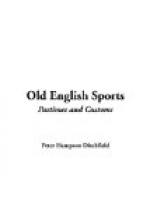CHAPTER VIII.
AUGUST.
“Crowned with the ears of corn, now come,
And to the pipe sing harvest home.
Come forth, my lord, and see the cart
Dressed up with all the country art:
The horses, mares, and frisking fillies
Clad all in linen white as lilies.
The harvest swains and wenches bound
For joy, to see the hock-cart crowned.”
HERRICK’S Hesperides.
Lammas Day—St. Roch’s Day—Harvest-home—“Ten-pounding”—
Sheep-shearing—“Wakes”—Fairs.
The harvest fields have begun to ripen, and the corn will soon be ready for the sickle; of this fact our forefathers were reminded by the Lammas Festival, which was celebrated on the first of this month. Lammas is a shortened form of the word Loaf-mass, or feast of the loaf. A loaf of bread was made of the first-ripe corn, and used in Holy Communion on this day; so this feast was a preliminary harvest thanksgiving festival—a feast of “first-fruits,” such as the Jews were commanded in the old Mosaic law to observe.
When the harvest was gathered in there were great festivities, and it has been thought that August 16th, St. Roch’s Day, was generally observed as the harvest-home. St. Roch, or Roque, was a Frenchman, who lived in the early part of the fourteenth century, and was supposed to have performed miraculous cures, but August 16th seems to have been rather early in the year for a harvest-home. However, when the feast of ingathering did take place, there were great rejoicings in our English villages, and the mode of its celebration helped to knit together the masters and labourers, and to promote good feeling between them.
When the fields were almost cleared of the golden grain, the last few sheaves were decorated with flowers and ribbons, and brought home in a waggon, called the “Hock-cart,” while the labourers, their wives and children, carrying green boughs, sheaves of wheat and rude flags, formed a glad procession. All the pipes and tabors in the village sounded, and shouts of laughter and of song were raised as the glad procession marched along. They sang—
“Harvest-home, harvest-home,
We have ploughed, we have sowed,
We have reaped, we have mowed,
We have brought home every load.
Hip, hip, hip, harvest-home!”
or, as they say in Berkshire—
“Whoop, whoop, whoop, harvest whoam!”
Sometimes the most comely maiden in the village was chosen as Harvest Queen, and placed upon her throne at the top of the sheaves in the hock-cart as it was drawn homewards to the farm.
[Illustration: HARVEST-HOME.]
The rustics receive a hearty welcome at their master’s house, where they find the fuelled chimney blazing wide, and the strong table groaning beneath the smoking sirloin—
“Mutton,
veal,
And bacon, which makes full
the meal,
With several dishes standing
by,
As here a custard, there a
pie,
And here all-tempting frumenty.”




